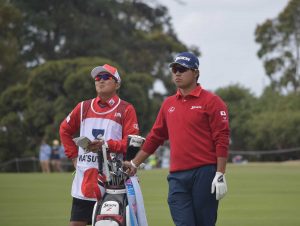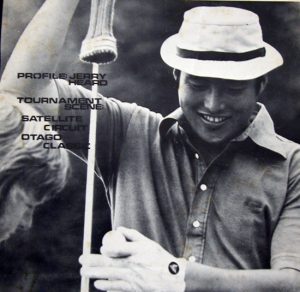Is Japan’s first male major title close at hand?
The likelihood of Japan’s Hideki Matsuyama becoming the first male golfer from that country to win a major championship looms large, the 24 year old already with three PGA Tour titles to his name in addition to his eight Japan Tour victories and five top tens in the major championships he has played as a professional.
Matsuyama, so early in his career, has shown a preparedness to take his game to the world, a trait not a lot of his fellow countrymen have been all that keen to do. I suppose the opportunity to play 30 or so events at home on the relatively lucrative Japan Tour is appealing to a player from any country if they had that chance and who could blame them but Matsuyama appears to have an international focus and a determination to succeed.
The Masters may well be the major that Matsuyama will win before any other having made the cut on two occasions at Augusta National as an amateur and recorded two top tens in three starts as a professional there he clearly enjoys the venue. Given his current form he shapes as a real chance, even as early as this year.
Having observed, first hand, Matsuyama playing in events in Australia and Thailand, it appears to me the most important attribute he possesses is self-belief. Sure, his stats are good especially in the area of ball striking but to have had as much success as he has already in the US, despite speaking very little English, tells the story of a young man with a great ability to adapt to any environment.
Other Japanese players have won on the PGA Tour namely, Isao Aoki and Shigeki Maruyama, the latter of whom won three times in the US but there is a feeling that Matsuyama is well on track to take Japanese golf to another level completely with victory in a major.
Japanese have occasionally gone close to winning a major, more especially Isao Aoki who finished runner-up to Jack Nicklaus at the 1980 US Open and in 1988 Tommy Nakajima finished 3rd at the US PGA Championship but that first major breakthrough is proving elusive.
Interest in golf in Japan gained a huge boost began when the World Cup of Golf, or Canada Cup as it was known then, was hosted by Japan in 1957, the home-side defeating Americans, Sam Snead and Jimmy Demaret, to win the event in their homeland and cause a frenzy and golfing awareness amongst Japanese fans.
Japan would win the World Cup of Golf again in 2002 but by then the Japan Golf Tour was well and truly up and running and players such as Aoki, Maruyama and Tommy Nakajima had been performing with distinction worldwide.
Later Ryo Ishikawa would play well on the PGA Tour, without winning, and more recently Matsuyama appears ready to claim that all important first major.
In the early 1970’s a Japanese player who achieved almost folklore status in that country emerged from a baseball career to take the Japan Tour by storm. Masashi (or Jumbo) Ozaki won more than 100 events in his own country and dominated the Japan Golf Tour for the best part of twenty five years but although he played 90 or so PGA Tour events he was never a member of that tour.
Ozaki recorded top tens in majors on three occasions and actually played the Masters on 19 occasions but his only overseas victory would come at the 1972 New Zealand PGA Championship at Mt Maunganui in the North Island where he defeated Bob Charles by six shots.
I was lucky enough to fluke the role as his caddy that week and to say the least his win was impressive, hitting the ball prodigious distances with the then small (1.62’) ball and easily accounting for a field of Australasian and other players so early in his career (he was 24).
I was 18 and it was the first occasion that I had experienced such success as a caddy and it left a lasting impression on what would be my own future in the industry of golf.
Ozaki, however, had it pretty easy at home in Japan. He was almost a cult figure there and other than a desire to be one of the greats in the game there was no real incentive for him to chase the riches of the PGA Tour.
He would, therefore, remain relatively unfulfilled in terms of what he might otherwise achieved if he had the determination and desire to capitalise on his amazing game at a higher level than the Japan Golf Tour.
Matsuyama, though, is a very much different character and it would seem realises that if he is to become one of the game’s greats then he has to compete on international tours on a regular basis and perhaps view the PGA Tour as his main tour rather than the Japan Tour.
Matsuyama took his game to another level in 2016 rising to the number 6 place in the world ranking but it would seem he is likely to take his place in the game to even greater heights in 2017.




